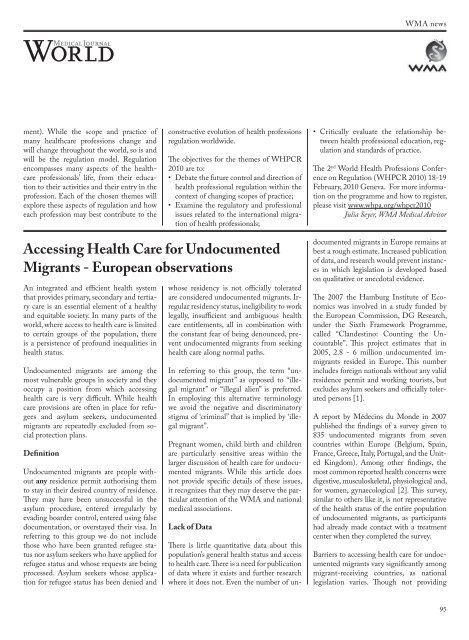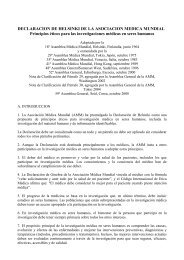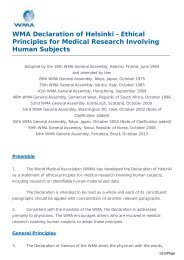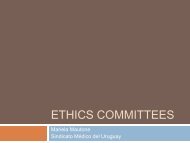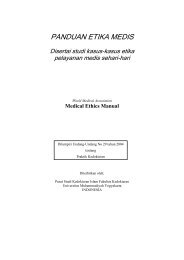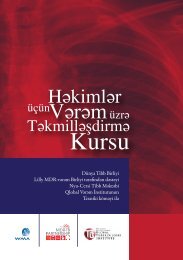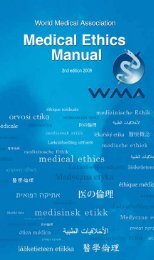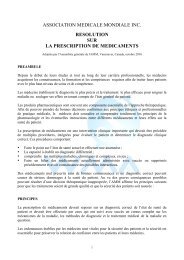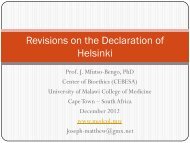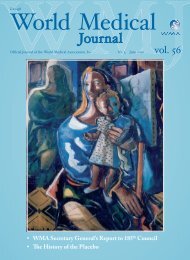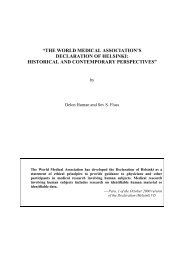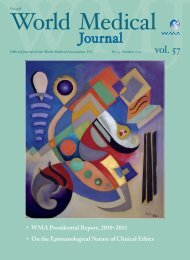wma 7-2.indd - World Medical Association
wma 7-2.indd - World Medical Association
wma 7-2.indd - World Medical Association
Create successful ePaper yourself
Turn your PDF publications into a flip-book with our unique Google optimized e-Paper software.
WMA news<br />
ment). While the scope and practice of<br />
many healthcare professions change and<br />
will change throughout the world, so is and<br />
will be the regulation model. Regulation<br />
encompasses many aspects of the healthcare<br />
professionals’ life, from their education<br />
to their activities and their entry in the<br />
profession. Each of the chosen themes will<br />
explore these aspects of regulation and how<br />
each profession may best contribute to the<br />
constructive evolution of health professions<br />
regulation worldwide.<br />
The objectives for the themes of WHPCR<br />
2010 are to:<br />
• Debate the future control and direction of<br />
health professional regulation within the<br />
context of changing scopes of practice;<br />
• Examine the regulatory and professional<br />
issues related to the international migration<br />
of health professionals;<br />
• Critically evaluate the relationship between<br />
health professional education, regulation<br />
and standards of practice.<br />
The 2 nd <strong>World</strong> Health Professions Conference<br />
on Regulation (WHPCR 2010) 18-19<br />
February, 2010 Geneva. For more information<br />
on the programme and how to register,<br />
please visit www.whpa.org/whpcr2010<br />
Julia Seyer, WMA <strong>Medical</strong> Advisor<br />
Accessing Health Care for Undocumented<br />
Migrants - European observations<br />
An integrated and efficient health system<br />
that provides primary, secondary and tertiary<br />
care is an essential element of a healthy<br />
and equitable society. In many parts of the<br />
world, where access to health care is limited<br />
to certain groups of the population, there<br />
is a persistence of profound inequalities in<br />
health status.<br />
Undocumented migrants are among the<br />
most vulnerable groups in society and they<br />
occupy a position from which accessing<br />
health care is very difficult. While health<br />
care provisions are often in place for refugees<br />
and asylum seekers, undocumented<br />
migrants are repeatedly excluded from social<br />
protection plans.<br />
Definition<br />
Undocumented migrants are people without<br />
any residence permit authorising them<br />
to stay in their desired country of residence.<br />
They may have been unsuccessful in the<br />
asylum procedure, entered irregularly by<br />
evading boarder control, entered using false<br />
documentation, or overstayed their visa. In<br />
referring to this group we do not include<br />
those who have been granted refugee status<br />
nor asylum seekers who have applied for<br />
refugee status and whose requests are being<br />
processed. Asylum seekers whose application<br />
for refugee status has been denied and<br />
whose residency is not officially tolerated<br />
are considered undocumented migrants. Irregular<br />
residency status, ineligibility to work<br />
legally, insufficient and ambiguous health<br />
care entitlements, all in combination with<br />
the constant fear of being denounced, prevent<br />
undocumented migrants from seeking<br />
health care along normal paths.<br />
In referring to this group, the term “undocumented<br />
migrant” as opposed to “illegal<br />
migrant” or “illegal alien” is preferred.<br />
In employing this alternative terminology<br />
we avoid the negative and discriminatory<br />
stigma of ‘criminal” that is implied by ‘illegal<br />
migrant”.<br />
Pregnant women, child birth and children<br />
are particularly sensitive areas within the<br />
larger discussion of health care for undocumented<br />
migrants. While this article does<br />
not provide specific details of these issues,<br />
it recognizes that they may deserve the particular<br />
attention of the WMA and national<br />
medical associations.<br />
Lack of Data<br />
There is little quantitative data about this<br />
population’s general health status and access<br />
to health care. There is a need for publication<br />
of data where it exists and further research<br />
where it does not. Even the number of undocumented<br />
migrants in Europe remains at<br />
best a rough estimate. Increased publication<br />
of data, and research would prevent instances<br />
in which legislation is developed based<br />
on qualitative or anecdotal evidence.<br />
The 2007 the Hamburg Institute of Economics<br />
was involved in a study funded by<br />
the European Commission, DG Research,<br />
under the Sixth Framework Programme,<br />
called “Clandestino: Counting the Uncountable”.<br />
This project estimates that in<br />
2005, 2.8 - 6 million undocumented immigrants<br />
resided in Europe. This number<br />
includes foreign nationals without any valid<br />
residence permit and working tourists, but<br />
excludes asylum seekers and officially tolerated<br />
persons [1].<br />
A report by Médecins du Monde in 2007<br />
published the findings of a survey given to<br />
835 undocumented migrants from seven<br />
countries within Europe (Belgium, Spain,<br />
France, Greece, Italy, Portugal, and the United<br />
Kingdom). Among other findings, the<br />
most common reported health concerns were<br />
digestive, musculoskeletal, physiological and,<br />
for women, gynaecological [2]. This survey,<br />
similar to others like it, is not representative<br />
of the health status of the entire population<br />
of undocumented migrants, as participants<br />
had already made contact with a treatment<br />
center when they completed the survey.<br />
Barriers to accessing health care for undocumented<br />
migrants vary significantly among<br />
migrant-receiving countries, as national<br />
legislation varies. Though not providing<br />
95


